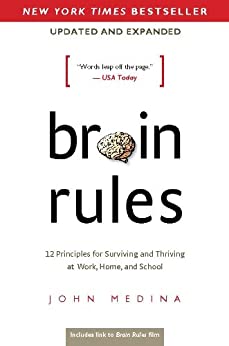Brain Rules
Every brain is wired differently. Exercise improves brain health and cognition. We’re designed to never stop learning and exploring. Memories are volatile. Sleep is connected to our ability to learn.

How will you age? Will you age like Jim or like Frank Lloyd Wright?
- Jim: On a wheelchair, sitting around, seemingly waiting to die. Eyes vacant, lonely, friendless. Could cry at the drop of a hat, but otherwise spent the last years of his life mostly staring off into space. Withered mind.
- Frank: Architect. Mind as incandescent as a light bulb. Very bright and enjoying life. Wisdom. Living a productive life.
Sleep
Sleep 8-9 hours a day.
The brain does not sleep when you are sleeping. It is wide awake and active.
Sleep Loss = Brain Drain
- Cripples Thinking
- Hurts attention, executive function, immediate/working memory
- Puts you in a bad emotional state
- Damages quantitative skills, logical reasoning ability
- Hurts Mathematical thinking
- Hurts manual dexterity, including fine motor control
Exercise
Move around. Exercise. Don’t sit for a long time.
What you do in life, both physically and mentally changes your brain.
Is there one factor that predicts how well you will age? Presence or absence of a sedentary lifestyle.
A lifetime of exercise can result in a sometimes astonishing elevation in cognitive performance, compared with those who are sedentary.
Exercise boosts memory, reasoning, attention, problem-solving, intelligence, ability to reason quickly and think abstractly, improvising off previously learned material in order to solve a new problem.
Can exercise prevent Brain Disorders?
- The risk of dementia and Alzheimer’s is significantly reduced if you exercise.
- Exercise releases the three neurotransmitters which affect the maintenance of mental health:
- Serotonin, dopamine, and norepinephrine
- Exercise is beneficial immediately and over the long term for depression and anxiety.
Exercise causes you to intake more oxygen, which acts as an efficient electron absorbing sponge. Any excess free radicals(electrons) are absorbed by the oxygen and converted into CO2, which leaves the body when you exhale.
Inhale fresh oxygen deeply. Your brain cannot go without oxygen for more than 5 minutes without risking serious and permanent damage.
Exercise improves blood circulation in the whole body. It provides your body greater access to oxygen and food. Exercise promotes neurogenesis, the formation of new cells in the brain. Exercise improves the immune system.
Diet
What happens after you eat Wheat or Sugar
- Glucose is absorbed into the bloodstream via the small intestines.
- They travel to all parts of the body, where they are deposited into cells.
- The cells seize the sweet stuff like sharks in a feeding frenzy. This process generates a lot of toxic waste, called free radicals. They are very, very harmful to the body.
Learning
You are a lifelong learner.
Do not multitask. Do one thing at a time, and do it well, with full attention.
Deliberately re-expose yourself to the information you want to remember over a long time.
Out of sight, out of mind.
If the brain doesn’t get the same information soon, the neuron will literally reset itself to zero and act as if nothing happened. Walk Away. Suspend initial judgment.
Lesson: To improve your thinking skills, MOVE!